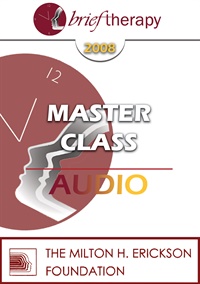
- Average Rating:
- Not yet rated
- Topic Areas:
- Master Classes | Brief Therapy | Experiential Therapy | Gestalt | Hypnosis | Ericksonian Hypnosis and Therapy Techniques
- Categories:
- Brief Therapy Conference | Brief Therapy Conference 2008
- Faculty:
- Jeffrey Zeig, PhD | Erving Polster, PhD
- Duration:
- 3:13:17
- Format:
- Audio Only
- Original Program Date:
- Dec 15, 2008
- Short Description:
- Gestalt therapy and Ericksonian hypnotherapy are experiential methods of change. In combination they can be synergistic. Psychotherapy is best when clients have a first hand experience of an alive therapeutic process. Such dynamic, empowering experiences pave the way for dynamic understandings. Drs. Polster and Zeig will offer brief introductions to their approaches. They will demonstrate their methods through live therapeutic sessions and they will engage with each other and the participants to examine commonalities and differences in their work.
- Price:
- $15.00 - Base Price
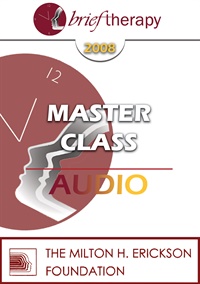
- Average Rating:
- Not yet rated
- Topic Areas:
- Master Classes | Brief Therapy | Experiential Therapy | Gestalt | Hypnosis | Ericksonian Hypnosis and Therapy Techniques | Hypnotherapy
- Categories:
- Brief Therapy Conference | Brief Therapy Conference 2008
- Faculty:
- Jeffrey Zeig, PhD | Erving Polster, PhD
- Duration:
- 2:31:17
- Format:
- Audio Only
- Original Program Date:
- Dec 15, 2008
- Short Description:
- Gestalt therapy and Ericksonian hypnotherapy are experiential methods of change. In combination they can be synergistic. Psychotherapy is best when clients have a first hand experience of an alive therapeutic process. Such dynamic, empowering experiences pave the way for dynamic understandings. Drs. Polster and Zeig will offer brief introductions to their approaches. They will demonstrate their methods through live therapeutic sessions and they will engage with each other and the participants to examine commonalities and differences in their work.
- Price:
- $15.00 - Base Price
- Average Rating:
- Not yet rated
- Topic Areas:
- Fundamentals of Hypnosis | Hypnosis | Hypnotic Induction
- Categories:
- Brief Therapy Conference | Brief Therapy Conference 2008
- Faculty:
- Ernest Rossi, PhD
- Course Levels:
- Master Degree or Higher in Health-Related Field
- Duration:
- 2:17:49
- Format:
- Audio and Video
- Original Program Date:
- Dec 14, 2008
- Short Description:
- Three brief, novel, creative and easy to learn approaches to the induction of therapeutic hypnosis that are appropriate for practically any client issue with any theoretical orientation will be shared with participants. All of these approaches have evolved from Erickson's original "hand levitation technique" and are consistent with the principles of art, beauty, and truth presented in the new 2008 series of "The Collected Works of Milton H. Erickson," Vol.1, "The Nature of Therapeutic Hypnosis."
- Price:
- $29.00 - Base Price
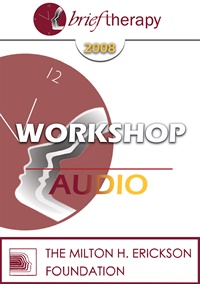
- Average Rating:
- Not yet rated
- Topic Areas:
- Workshops | Brief Therapy | Therapist Development | Transpersonal
- Categories:
- Brief Therapy Conference | Brief Therapy Conference 2008
- Faculty:
- Robert Dilts, BA
- Duration:
- 2:49:16
- Format:
- Audio Only
- Original Program Date:
- Dec 14, 2008
- Short Description:
- The notion of a relational or transpersonal "field" is an important emerging concept in Brief Therapy. A "field" is a type of space or energy produced by relationships and interactions in a system that often holds deeper, more archetypal information. It is similar to what Gregory Bateson referred to as a "larger mind" and "the pattern which connects." This workshop will explore methods to recognize and work with such fields as part of a Brief Therapy session.
- Price:
- $15.00 - Base Price
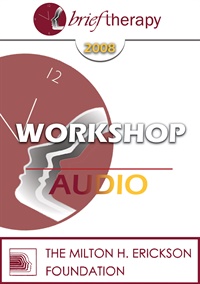
- Average Rating:
- Not yet rated
- Topic Areas:
- Workshops | Hypnosis | Psychotherapy | Brief Therapy | Four-Stage Creative Process
- Categories:
- Brief Therapy Conference | Brief Therapy Conference 2008
- Faculty:
- Ernest Rossi, PhD
- Duration:
- 2:29:07
- Format:
- Audio Only
- Original Program Date:
- Dec 14, 2008
- Short Description:
- This is an entirely experiential workshop where you can learn how to facilitate the classical four-stage creative process with three easy-tolearn activity-dependent approaches to therapeutic hypnosis and psychotherapy. How you as a psychotherapist can relax with a bemused smile while your clients do all the work in resolving their issues.
- Price:
- $15.00 - Base Price
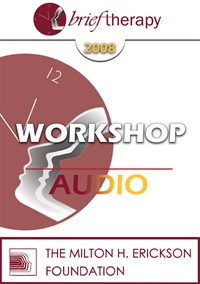
- Average Rating:
- Not yet rated
- Topic Areas:
- Workshops | Trauma | Brief Therapy | Mind-Body | Pain and Healing
- Categories:
- Brief Therapy Conference | Brief Therapy Conference 2008
- Faculty:
- Peter Levine, PhD
- Duration:
- 1:57:13
- Format:
- Audio Only
- Original Program Date:
- Dec 14, 2008
- Short Description:
- It is common to see clients who present with complex arrays of symptoms. These symptoms can be persistent or "mutate" unexpectedly, leaving patient and therapist feeling confused, frustrated and helpless. In this presentation, we will see how states of unresolved stress and trauma can be the underlying force that drives multiple elusive symptoms. These include panic, depression, insomnia, migraines, severe PMS, chronic pain, fibromyalgia and chronic fatigue.
- Price:
- $15.00 - Base Price
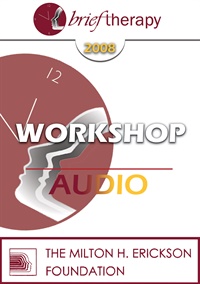
- Average Rating:
- Not yet rated
- Topic Areas:
- Workshops | Brief Therapy | Experiential Therapy
- Categories:
- Brief Therapy Conference | Brief Therapy Conference 2008
- Faculty:
- Stephen Karpman, MD
- Duration:
- 1:20:33
- Format:
- Audio Only
- Original Program Date:
- Dec 14, 2008
- Short Description:
- Patients enter therapy trapped in games far too complicated to solve by themselves. The therapist offers insights by simplifying the double and triple roles in the Drama Triangle, and offers clear choices by simplifying the possible escape routes to use. An experiential exercise is included.
- Price:
- $15.00 - Base Price
Tags: Brief Therapy Experiential
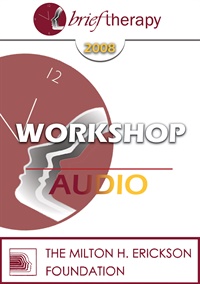
- Average Rating:
- Not yet rated
- Topic Areas:
- Workshops | Post-Traumatic Stress Disorder (PTSD) | Brief Therapy | Clinical Demonstrations
- Categories:
- Brief Therapy Conference | Brief Therapy Conference 2008
- Faculty:
- Steve Andreas, MA, NLP
- Duration:
- 2:47:11
- Format:
- Audio Only
- Original Program Date:
- Dec 14, 2008
- Short Description:
- This extended workshop offers a practical, step-by-step approach to resolving trauma, phobias, and shock memories without re-exposure or detailed content analysis. Through live demonstrations and careful attention to internal imagery, posture, and sensory processing, it shows how dissociation, perspective shifts, and simple experiential interventions can quickly reduce emotional charge and restore choice, even with long-standing or repeated trauma.
- Price:
- $15.00 - Base Price
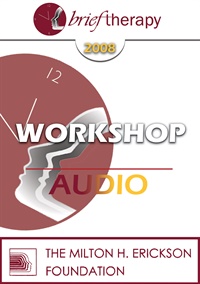
- Average Rating:
- Not yet rated
- Topic Areas:
- Workshops | Brief Therapy | Children and Adolescent Therapy | Divorce | Family Therapy
- Categories:
- Brief Therapy Conference | Brief Therapy Conference 2008
- Faculty:
- Florence Kaslow, PhD, ABPP
- Duration:
- 2:16:47
- Format:
- Audio Only
- Original Program Date:
- Dec 14, 2008
- Short Description:
- What are the differential impacts of divorce on children? This workshop will consider the thoughts, feelings, behavior, issues, concerns and needs of children in different age groups, from birth to 50 years, within the framework of the stages of the divorce process and for years afterwards. Lecture, discussion, clinical examples and role plays will be interspersed as efficacious interventions are considered.
- Price:
- $15.00 - Base Price
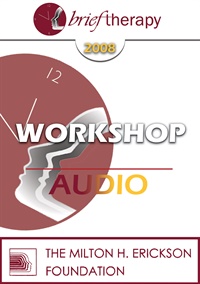
- Average Rating:
- Not yet rated
- Topic Areas:
- Workshops | Art and Creativity | Brief Therapy | Experiential Therapy | Psychology
- Categories:
- Brief Therapy Conference | Brief Therapy Conference 2008
- Faculty:
- Jeffrey Zeig, PhD
- Duration:
- 2:04:07
- Format:
- Audio Only
- Original Program Date:
- Dec 14, 2008
- Short Description:
- Changing mood and perspective is central in brief therapy. Experiential methods can be more immediately effective than traditional didactic approaches. All art is, by definition, "experiential." Altering mood and perspective is the point of it - whether drama, painting, literature, dance or music. Movies use multilayered methods for change. The viewer is often unaware of the intricate dramatic, experiential techniques that filmmakers use to exert influence. Social psychology studies the way in which people are influenced outside of awareness.
- Price:
- $15.00 - Base Price
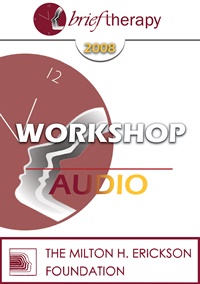
- Average Rating:
- Not yet rated
- Topic Areas:
- Workshops | Resistance | Religion | Binds | Brief Therapy | Hypnosis
- Categories:
- Brief Therapy Conference | Brief Therapy Conference 2008
- Faculty:
- Bill O'Hanlon, MS
- Duration:
- 2:18:23
- Format:
- Audio Only
- Original Program Date:
- Dec 14, 2008
- Short Description:
- Inclusive Therapy is a new model of therapy designed to deal with the ambivalence to change clients often bring to the therapy process. Participants will learn a gentle way to approach conflicted clients to dissolve resistance, binds and dissociation. This method can be especially useful in dealing with borderline or hostile clients.
- Price:
- $15.00 - Base Price
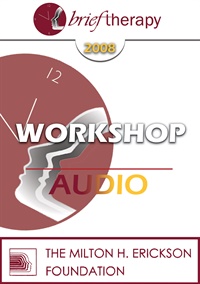
- Average Rating:
- Not yet rated
- Topic Areas:
- Workshops | Brief Therapy | Psychotherapy | Resources | Self-Relations
- Categories:
- Brief Therapy Conference | Brief Therapy Conference 2008
- Faculty:
- Stephen Gilligan, PhD
- Duration:
- 2:43:52
- Format:
- Audio Only
- Original Program Date:
- Dec 14, 2008
- Short Description:
- A key idea in Milton Erickson's work was that a person's problematic experiences and behaviors can be skillfully accepted and utilized as the basis for therapeutic change. Self-relations psychotherapy develops this idea further, emphasizing symptoms as indicating the death of an old identity and the impending birth of a new identity. Thus, we don't try to "get rid of" depression, anxiety, or other "acting out/acting in" expressions, but instead invite them into a human relationship of "sponsorship", where their healing and helpful nature may be realized. In this workshop, we will see how a therapist can generate a ritual space where symptoms and other disturbing experiences can be "midwifed" into new identities.
- Price:
- $15.00 - Base Price
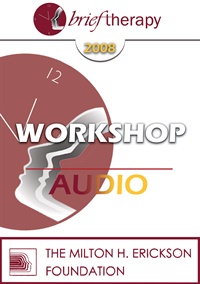
- Average Rating:
- Not yet rated
- Topic Areas:
- Workshops | Psychotherapy | Single-Session | Brief Therapy
- Categories:
- Brief Therapy Conference | Brief Therapy Conference 2008
- Faculty:
- Michael Hoyt, PhD
- Duration:
- 2:08:31
- Format:
- Audio Only
- Original Program Date:
- Dec 14, 2008
- Short Description:
- Many therapies involve brief lengths of treatment. A structure will be presented for organizing the tasks and skills involved in different phases (pre, early, middle, late and follow-through) of therapy. Numerous case examples, including video, will illustrate brief therapy techniques both in initial sessions and in the course of longer treatments.
- Price:
- $15.00 - Base Price
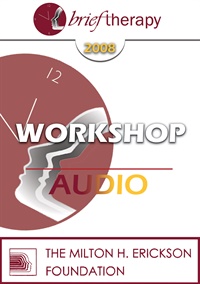
- Average Rating:
- Not yet rated
- Topic Areas:
- Workshops | Generative Psychotherapy | Brief Therapy | Buddhism | Meditation, Spirituality and Yoga | Mindfulness | Psychotherapy
- Categories:
- Brief Therapy Conference | Brief Therapy Conference 2008
- Faculty:
- Stephen Gilligan, PhD
- Duration:
- 2:43:38
- Format:
- Audio Only
- Original Program Date:
- Dec 14, 2008
- Short Description:
- The challenge of personal transformation is faced differently in the East and West. Typically, Eastern meditation emphasizes how to cultivate higher states of consciousness that "go beyond" ego identifications, while Western therapy focuses on how to "work through" problematic states. This workshop explores an integrative model that suggests how to use both approaches in a complementary way: sometimes "transcending, sometimes "transforming", and often doing both at the same time. The connection between meditation, generative trance, and selfrelations will be a central focus.
- Price:
- $15.00 - Base Price
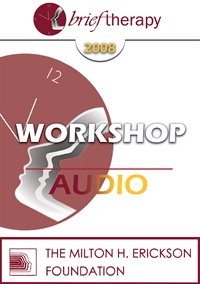
- Average Rating:
- Not yet rated
- Topic Areas:
- Workshops | Hypnosis | Psychotherapy
- Categories:
- Brief Therapy Conference | Brief Therapy Conference 2008
- Faculty:
- Michael Yapko, PhD
- Duration:
- 2:32:58
- Format:
- Audio Only
- Original Program Date:
- Dec 14, 2008
- Short Description:
- This session explores hypnosis as both a subject of modern neuroscience and a practical tool in psychotherapy. Emphasizing dissociation, selective attention, and suggestion, it highlights how hypnosis deepens cognitive and experiential shifts across contexts such as pain management, depression, and memory work. Participants gain a framework for integrating formal and informal hypnosis into their practice, using it not as a therapy in itself but as a powerful way to deliver ideas, evoke resources, and strengthen therapeutic outcomes .
- Price:
- $15.00 - Base Price
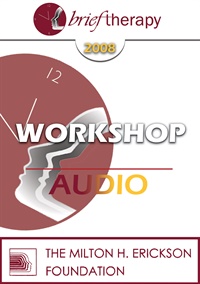
- Average Rating:
- Not yet rated
- Topic Areas:
- Workshops | Mindfulness | Acceptance and Commitment Therapy (ACT) | Therapeutic Relationship | Brief Therapy | Therapist Development
- Categories:
- Brief Therapy Conference | Brief Therapy Conference 2008
- Faculty:
- Steven Hayes, PhD
- Duration:
- 1:46:28
- Format:
- Audio Only
- Original Program Date:
- Dec 14, 2008
- Short Description:
- The evidence that the relationship matters in psychotherapy is vast, but that knowledge is of limited usefulness until it is known how to create powerful therapeutic relationships. The relevance of the Acceptance and Commitment Therapy (ACT) model to this issue is described, and specific methods are described and shown that can increase the potency of the therapeutic relationship.
- Price:
- $15.00 - Base Price
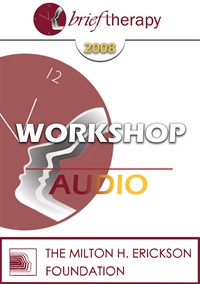
- Average Rating:
- Not yet rated
- Topic Areas:
- Workshops | Seeding | Brief Therapy | Ericksonian Hypnosis and Therapy Techniques | Psychotherapy
- Categories:
- Brief Therapy Conference | Brief Therapy Conference 2008
- Faculty:
- Jeffrey Zeig, PhD
- Duration:
- 2:24:19
- Format:
- Audio Only
- Original Program Date:
- Dec 14, 2008
- Short Description:
- In the literature, music and drama, artists often covertly foreshadow impending events. In social psychology there are myriad studies of priming, an effect by which the accessibility of a future target is increased by the presentation of an earlier cue. Priming effects illuminate important facets of interpersonal responsiveness. Milton Erickson was the first therapist to seed future ideas in the course of strategic therapy and hypnosis. Seeding is an important concept that can increase the effectiveness of interventions regardless of the technique that will be used. We will learn to harness seeding methods through lecture, demonstration and practice.
- Price:
- $15.00 - Base Price
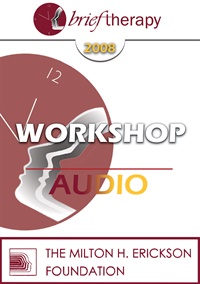
- Average Rating:
- Not yet rated
- Topic Areas:
- Workshops | Brief Therapy | Somatic Experiences
- Categories:
- Brief Therapy Conference | Brief Therapy Conference 2008
- Faculty:
- Robert Dilts, BA
- Duration:
- 2:27:11
- Format:
- Audio Only
- Original Program Date:
- Dec 14, 2008
- Short Description:
- There is an old saying that "knowledge is only a rumor until it is in the muscle." This is nowhere more true than in Brief Therapy. This workshop will explore how physical and somatically oriented techniques, such as spatial sorting, centering and "Somatic Syntax" can be used to help clients discover and internalize lasting solutions to a variety of problem situations.
- Price:
- $15.00 - Base Price
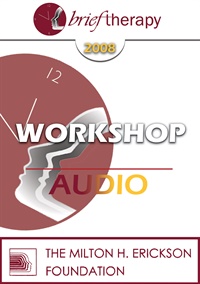
- Average Rating:
- Not yet rated
- Topic Areas:
- Workshops | Multicultural | Storytelling | Brief Therapy | Consciousness
- Categories:
- Brief Therapy Conference | Brief Therapy Conference 2008
- Faculty:
- Jean Houston, PhD
- Duration:
- 2:55:30
- Format:
- Audio Only
- Original Program Date:
- Dec 14, 2008
- Short Description:
- This workshop will explore archetypical and imaginal sources for Social Artistry, and address states of consciousness research as it applies to exploring the possible human and the possible society.
- Price:
- $15.00 - Base Price
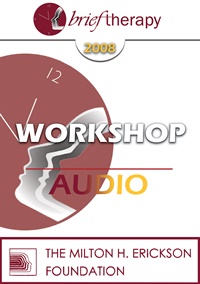
- Average Rating:
- Not yet rated
- Topic Areas:
- Workshops | Rational Emotive Behavior Therapy (REBT) | Brief Therapy
- Categories:
- Brief Therapy Conference | Brief Therapy Conference 2008
- Faculty:
- Debbie Joffe Ellis
- Duration:
- 2:55:05
- Format:
- Audio Only
- Original Program Date:
- Dec 14, 2008
- Short Description:
- This workshop will describe the main techniques and benefits of Rational Emotive Behavior Therapy (REBT), as well as discuss its efficiency and effectiveness as a brief therapy. Participants will learn important and helpful self-work to do after therapy. There will be live demonstrations with audience volunteers, and time for questions from participants.
- Price:
- $15.00 - Base Price
Tags: Brief Therapy REBT
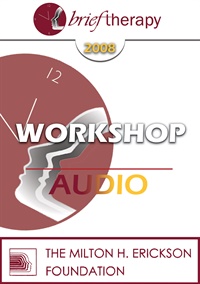
- Average Rating:
- Not yet rated
- Topic Areas:
- Workshops | Brief Therapy | Motivation | Psychotherapy
- Categories:
- Brief Therapy Conference | Brief Therapy Conference 2008
- Faculty:
- Bill O'Hanlon, MS
- Duration:
- 1:52:21
- Format:
- Audio Only
- Original Program Date:
- Dec 14, 2008
- Short Description:
- "If you want truly to understand something, try to change it." - Kurt Lewin. Change is one of the most challenging aspects of life. Yet there are identifiable ways we all change. In this short session, you will learn the seven major ways people change and how to identify and tap into people's natural motivational styles to create change.
- Price:
- $15.00 - Base Price
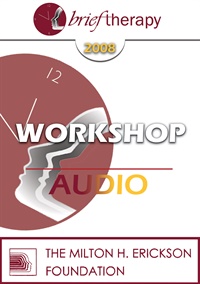
- Average Rating:
- Not yet rated
- Topic Areas:
- Workshops | Brief Therapy | Personality Disorders | Therapist Development
- Categories:
- Brief Therapy Conference | Brief Therapy Conference 2008
- Faculty:
- Claudio Naranjo, MD
- Duration:
- 2:31:27
- Format:
- Audio Only
- Original Program Date:
- Dec 14, 2008
- Short Description:
- This workshop is a succinct review of the neurotic needs and fixed dysfunctional ideas of 27 personality structures in Ichazo's proto-analysis, Illustrated through film excerpts and comments from participants.
- Price:
- $15.00 - Base Price
- Average Rating:
- Not yet rated
- Topic Areas:
- Fundamentals of Hypnosis | Hypnosis | Goals of the Therapist | Psychotherapy
- Categories:
- Brief Therapy Conference | Brief Therapy Conference 2008
- Faculty:
- Michael Yapko, PhD
- Course Levels:
- Master Degree or Higher in Health-Related Field
- Duration:
- 2:47:38
- Format:
- Audio and Video
- Original Program Date:
- Dec 14, 2008
- Short Description:
- This workshop shows how hypnosis can be used as a goal-oriented, brief therapy, illustrated through live demonstrations and group participation. Participants experience how guided attention, metaphor, and suggestion help uncover overlooked resources and reframe familiar struggles. The session highlights real-world examples of how hypnosis amplifies client strengths, manages pain, and supports emotional regulation, offering practical strategies for fostering resilience and change.
- Price:
- $29.00 - Base Price
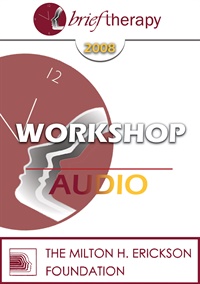
- Average Rating:
- Not yet rated
- Topic Areas:
- Workshops | Brief Therapy | Therapist Development
- Categories:
- Brief Therapy Conference | Brief Therapy Conference 2008
- Faculty:
- Casey Truffo, M.S.,M.F.T.
- Duration:
- 2:58:47
- Format:
- Audio Only
- Original Program Date:
- Dec 14, 2008
- Short Description:
- Feel uncomfortable about marketing your private practice? Tried marketing with disappointing results? You're not alone. Most therapists weren't taught in school how to build and market a financially rewarding practice. This presentation offers practical, step-by-step instructions to building an effective, ethical and low-cost marketing plan to attract self-paying clients and increase your marketing confidence. In addition, since the internet will be the number one way you attract clients in the next decade, we will also discuss websites and other online tools you can use to attract clients via the internet.
- Price:
- $15.00 - Base Price

- Average Rating:
- Not yet rated
- Topic Areas:
- Workshops | Children and Adolescent Therapy | Trauma | Brief Therapy
- Categories:
- Brief Therapy Conference | Brief Therapy Conference 2008
- Faculty:
- Peter Levine, PhD
- Duration:
- 1:43:27
- Format:
- Audio Only
- Original Program Date:
- Dec 14, 2008
- Short Description:
- This workshop will explore trauma along a child's developmental continuum. We will investigate how the effects of trauma can result not only from catastrophic events, but from commonplace events. At the core of this understanding is the unique way that trauma is imprinted on the body, brain and spirit. This workshop will demonstrate how trauma can be both prevented and resolved through play, art and sensory-motor activities. Participants will learn through combination of lectures, videos, case presentations and experiential activities.
- Price:
- $15.00 - Base Price
Tags: Brief Therapy Children Trauma


